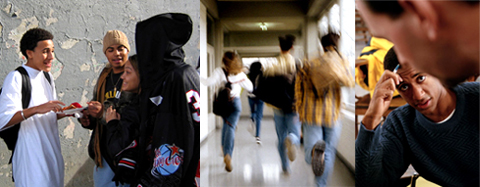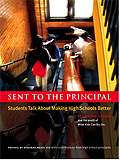
What students tell principals...
On knowing us
Whenever there's good news, our principal always acknowledges it. When we got into [the city's student council], she went up to our teachers and told them, and she announced it in the school. We could go up to her and tell her anything. Like if we have a new baby brother, she'll be like, "Oh, congratulations," and just seem so happy for you. (Katherine)
My principal knows most of the students very well, what we try to do at school and what we don't. If there's something wrong, like if you're sad, he knows, and he's there if you want to talk to him. There's a summer program I want to go to, and the principal tries to help, he gets your grades for you, whatever you need. He really cares. (Enka)
My first impression was that he was a good principal, because the first day he already knew half of the people in the school's names, and in the hallways he would joke around with you. He takes time to talk to you and ask how you're doing, like not only in school but at home. I think that's pretty nice. (Karina)
Students have to know who you are, to trust that you are part of all the different cultures in the school. You don't only have Latinos, you don't only have Asians, blacks, or something, right? Go to classes, get to know all the different students, talk with them, get to know who they are, sit with them so they know who you are. Don't just sit in the corner of the class and look at the students; actually participate in the work, sit next to them. (Leticia)
On working things out
Students are the main source, and if you don't tap into it, then you're never going to know what to do. Every time something major is about to change about the way things are run in your school, like schedule or curriculum, you should run it by your students. And if it's something that would affect students in a bad way, and you can't do anything about it, then you should say that to them. (Asiya)
A student always wants to feel like they have accomplished something and they have done something positive. I think it's just how you approach the students, not making the student feel that they're always doing something wrong, but that they can do something right, and there's rewards out there for you to do something right. (Rayna)
Everybody wanted to listen to CD players with headphones, during break when we went from one class to another. The principal didn't really trust us to make that a law, but they allowed it 'cause they were like, "We'll see what will happen." The students don't listen to it during class, they pause it but just leave it on their table, and the teachers don't mind 'cause they know it's turned off. And then during break they turn it on. (Enka)
When stuff actually follows through, when you see the change happen, you find a new respect for your principal. We're not allowed to have a water bubbler in our dance studio because it's a fire hazard—entrance-wise, there's no space for it. One of the girls petitioned the principal to get a water vending machine, and now we have it. (Tainisel)
Adolescents are known to be rebellious. And the only way to get over that is to be in an environment where the administration isn't just as stubborn as the students. (Adit)
On keeping us safe
We're kids, and we're bound to mess up. Kids make mistakes, everybody's not perfect. We're not just doing it because we feel like it, you know what I'm saying? There has to be a deeper reason, a reaction, for every action. So don't just put us in a jail cell. We need-information at least. (Kayla)
There's nothing constructive about kicking kids out of school. Or suspending kids, when in fact, you could have some kind of more helpful program for the kids themselves. In the end, you don't just want the safety of everyone. You want the kids to become better people. (Adit)
We need a principal that enforces rules and teachers that aren't afraid to approach students and keep them in line. That may seem like it's cracking down on individual liberties, but the reality is, if you have kids who are getting jumped and no one really feels safe, you have to put safety ahead of a vibe. (Luke)
It's enough that we have security guards patrolling our school, but to have cameras watching everything we do-it's very demeaning. I mean, we talk to our friends, we have boyfriends. (Eleonora)
Our school is [near a subway stop that] most students have to walk through, not a really safe area, and a couple of students were jumped and beat up. We had an assembly about it, so the principal could let us know a whole bunch of precautions-other routes, other options, don't walk by yourself, things we could do to take care of ourselves. Also, they got more police in the area, and the teachers even went themselves to make sure students are okay. (Apocalipsis)
On letting us express ourselves
At our school, if they see you with a graffiti sketchbook, they take it away from you. There's no reason for that, because it really is a way to express the culture, or just to get some stress off your mind. Art is like poetry, you just express your inner self, slap something on. (Joseph)
There has to be room for kids just to express themselves, and not be told to be quiet. We have kids randomly bring in their guitars on Fridays and sit around and play. For Cinco de Mayo, someone brought in a drum set and everyone was just in our little multipurpose room bonding. Don't force us to do it, don't give us a time limit, don't tell us what's appropriate and what's not, just let us say it! It lets you know that you're not alone, you're not crazy, you're not the only kid that feels that way. (Carly)
Provided there's no lights and fireworks coming out of the clothes, just let it be. It's just clothes. The more attention you give to it, the more kids are going to want to rebel. Teachers who feel that it's a distraction in the classroom can set limits in there. But if the teacher thinks that clothes are extremely distracting, I think the class would have to agree. (Kylie)
So many problems could be resolved if the principals would actually sit down and say, you know, what are those about? Why are you wearing those? That would make such a big difference. (Katie)
On making school interesting
The smart teachers find the smallest reason why you might need math, or you might need science. If you have asthma, you're worrying about your lungs, your pulmonaries. That's something you know-you're having trouble with your breathing. Maybe your mom has diabetes, or your dad has a bad heart. And so we listen, even begrudgingly, because it makes sense. (Vance)
Take activities that show promise, like the Black Students League, and incorporate it into the school so that it's just as valid as the third period German class. Unlike a German class, unlike a history class, extracurriculars are things that students are demonstrating a voluntary interest in. And if you make that interest a piece of the school's community, you have successfully incorporated those students into the school, and you've made them have a vested interest in the affairs of your school. (Adit)
This year some students had problems with the electives, so we went and met with the principal. And he actually wrote a proposal and got money, so next year it will be better electives. Then we had about six meetings, we had a case study, and we voted for some electives that we'd like to have for next year. (Jerry)
We integrated a lot of things into it, like history, which I love, and Darwin. And I did a History Day project on teaching creation science versus religion in public schools. And I got to study a lot of philosophy, which I like a lot. Also I oil painted an interpretation of a metaphor in a book we were reading in philosophy, Sophie's World, where the world is like a white rabbit coming out of the top of the universe. It all carried together. (Amber)
We need a class for discussion, because I have opinions about things. I know my classmates have opinions, too. We tried to start a discussion about human rights in history class this year, and the teacher wouldn't let us finish. He said, "We have to keep to the curriculum." And so you're like, "Well, this is the curriculum! This is what I'm thinking about!" (Daria)
On supporting good teaching
The principal should check up the same on students and teachers. Say a student was having problems in a certain subject and the principal asked what's wrong, and the student said, "I'm trying to understand, but I just don't." Then the principal can go to the teacher and say, "There's probably some other people who don't understand, and maybe you should try to teach in another way." (Asiya)
Go around and converse with the students, just a salutation walking down the halls, or while they're eating lunch. The principal can ask, "What are the good things in this class that the teacher is doing, what can be improved?" If the students feel comfortable with the principal, they can talk about problems with their classes. (Rayna)
Download a PDF of excerpts from the book>> Click here to order a copy of Sent to the Principal: Students Talk About Making High Schools Better by Kathleen Cushman and the youth of What Kids Can Do.

(Next Generation Press, May 2005)